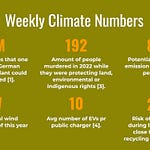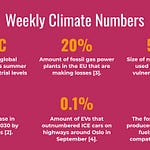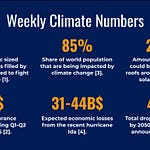Welcome to this weeks edition of The Weekly Climate! 🎉

The last cow (Oct 4 2020) — Nancy came running toward Catherine. As fast as she could. She always did that when Catherine rang the bell. Catherine hugged Nancy. “Come on Nancy, it’s time to go inside”. Catherine tied a leash to her collar and started to walk. Nancy followed her, as she always did. Catherine had bought the farm from a farmer who after eating cows was banned had to shut down. At that time the farmer had two cows left and Nancy was one of them. She was just a calf then. One of the last of her kind to be born for the purpose of slaughtering her. But the government saved her, by banning sale of all live ruminant food products. Or although the government instituted the ban, it was really the rise of synthetic meat that saved her.
Looking at the shear numbers cows had been one of the most successful species on the planet. However, as the demand for cow meat dwindled so did the numbers of cows. Still despite her species numbers dwindling it was clear that each individual now had a much better life.
In the late 2020s it became clear that people were never going to let go of meat. And at the time there were two pathways: Either we could feed cows feed that reduced their methane output and had to keep them off grass or we could all switch to synthetic meat. Most countries favored the synthetic meat option as that one also came without further increasing animal cruelty by in addition to slaughtering them also had to keep the ruminants off grazing lands. Synthetic meat was the logical choice because it could also be engineered to contain a multitude of nutrients that made it healthier than ruminant meat. Unfortunately, that left a lot of farmers without jobs.
Catherine was the CEO of RealFood one of the synthetic meat companies that had grown explosively since then. RealFood grew real meat from real animal cells, but without the live animal. This not only completely removed the cruelty of slaughtering live animals, but also enabled the company to tailor different meat products that people were used to. This helped accelerate the transition to synthetic meat right before the ban and the company obviously only took off even more after the ban. To Catherine, the switch was so obvious. The animal cow meat machine was very inefficient. It converted grass to meat very slowly and with a huge output of methane. RealFood meat was made in a giant factory powered by solar power and from just a single cell they could grow a 200g steak in one week and that time was continuously dropping as the technology matured. They even had a product in their pipeline that enabled people themselves to grow their own meat. This Catherine thought, were going to be their blockbuster.
After the cow meat ban, cows had lingered in a weird “persona non-grata” state in the world. Because even though it was illegal to slaughter cows for the purpose of eating them they were still here and they still released methane when they were out on grasslands.
Catherine opened the gate to the stable and let Nancy inside. Before this huge side of the farm housed around 50 cows in small enclosures. Nancy had grown too big to be inside the house so Catherine had remodeled the stable to be Nancy’s playground. There were small trees, a couple of big balls that Nancy could push around and a lot of soft hay that she could lie in. The room was big enough that she could run around a bit inside. There were even a couch and a TV such that they could relax together.
Catherine let Nancy loose and went into the house to get a bag of her NoGas brand algae feed. Ruminant feed was a heavily regulated business nowadays. Catherine had to register how much feed she fed Nancy each month such that the government could ensure that Nancy’s methane output stayed below acceptable levels and she had to document it with receipts from the purchased feed. That included grazing. Nancy was only allowed out on grass for one hour each day and that was documented with a monitor in her collar. Still Catherine was sure that the life Nancy had now was better than the meaningless life in captivity just to be slaughtered. Nancy was still a captive, but at least she was taken care of in the style of a 5-star hotel.
This has been a short story written about what the future might look like in a world where we have solved the climate crisis. Before I leave you to the newsletter, ask yourself this question: Even if climate change wasn’t happening, wouldn’t you want this future instead?
🏃♂️💨The quick overview
For those in a hurry here we go:
Climate & Science: A focus on fires this week with a look at the state of wildfires across the world.
Technology: A small fusion reactor design looks promising and China’s biggest solar farm went online last week.
Startups: Spotlight on sustainable food production (which inspired the introduction to this weeks newsletter) as well as tree planting drones and nordic batteries.
Investing: More fossil fuel divestment and a wake up call from OECD about the messiness of ESG investing.
Major Carbon Emitters: Lots of news about the enemy this week biggest one is probably that the fossil fuel industry is leaving tax payers with a 280B$ bill for cleaning up their used up wells.
Politics: Deeper dives into China’s 2060 carbon neutrality pledge and California’s ban on ICE cars.
Climate Justice: Methane leak in LA affected a low income neighborhood but was hid for a year and Mexican farmers revolt because of water export to US.
Other: Proud Boys and petro-masculinity (stolen headline from Heated) and Katherine Hayhoe gives advice on how to talk about climate change.
🐢The long overview
For those who want to dive deeper, brace yourselves, the long overview is coming.
🕵️♂️Stories we follow
U.S. Presidential Election. The U.S. is a major emitter and are run by a climate sceptic and fossil fuel friendly… person. We need a change. And after Joe Biden was elected as the democratic candidate that change has to be him. Hence we keep a close watch on his climate aspirations. The first presidential debate was on last week and Trump’s supporters thought Trump performed the best that any president have ever done. Needless to say they’re the only ones. The rest of us who are logical thinking creatures who believes in such craziness such as truth don’t. Heated wrote a blazing criticism of the climate debate and points out that the only point during the debate that Trump didn’t interrupt was during the climate debate. As did Gizmodo’s Earther. Grist did a fact check of Trumps climate comments during the debate — and he doesn’t pass with flying colors I’ll tell you that. He actually proposed to nuke hurricanes as a way to get rid of them and surprisingly he’s not the only president in the U.S. have proposed that. Oh man he just can’t win. On the other side of the aisle, Insideclimatenews published a review of what Biden can do to the oil and gas industry and they conclude a lot, but not as much as many people hope. Finally, CleanTechnica provided an analysis of the Obama / Biden administration, Trump / Pence and Biden / Harris pledges in terms of climate policy.
Disclaimer about the next story about BP: I should make it absolutely clear that me bringing BP at the top of this newsletter is by no means an endorsement. In fact I believe this to be yet another fossil fuel industry scam. But if it turns out not be then BP will be a model for other fossil fuel industry companies to follow, which is why it is important. And if it turns out to be scam, well then it will be used front and center once again as an example of the fossil fuel industries many lies. It’s therefore a win-win to bring it front and center here.
Better Petroleum (BPs) climate aspirations. BP has announced that it will slash oil production by 40%. If history teaches us anything it is that this will be just another load of bullcrap just like Beyond Petroleum were 20 years ago. But we will see. By putting the story up top here we aim to track it carefully. Not a lot of news about BP that I could find this week. But one interesting story is that BP (and Shell and many others) is still a member of the major anti-climate lobby organisations. So there’s that.
👩🔬Climate & Science
Bloomberg published a look at what the EU are doing to prevent and fight wildfires. And an important conclusion is that forest management (obviously) does matter. And they show a clear trend that the total burnt area in the Mediterranean has come down since the 1980s.
But let’s not forget that, although forest management does matter for preventing, containing and fighting wildfires, all of these natural disasters from hurricanes to wildfires are getting exacerbated by climate change. VOX provide a great overview of the latest research around this.
And more fire news. The Amazon are facing the worst wildfires in a decade. And a yet another scary part of the California wildfires is that solar power output has dropped dramatically during the fires.
🤖Technology
For the energy transition fusion is the holy grail. However, it is still expected to take many decades before the first fusion reactor is proven to work. Hence, fusion is not very relevant for the climate crisis. But an optimistic study has shown that a new design of a small fusion reactor is “very likely to work”.
If anybody’s interested take a look at this article about China’s largest solar power plant. 2.2GW behemoth — look at this thing and how huge it is! The solar power plant went online last week.
💡Startups
The nordic battery factory startup Northvolt just raised 600M$ to expand production capacity and R&D.
Canadian startup Flash Forest has demonstrated their drone platform for planting trees more effective. By 2028 they plan to have planted more than 1billion trees.
Greentech Festival in Berlin in September showcased a range of interesting approaches to sustainable food production. Among others a number of cultured meat companies and a company making food out of solar power and air.
💰Investing
Cambridge University have announced that they’re going to divest 4.5B$ in fossil fuel companies. And related, the Science Based Targets for Financial Institutions (SBTi) launched last week, which is (yet another, see former newsletters) framework that wants to help asset managers invest sustainably.
I have written before about how ESG is both a blessing and a curse, perhaps mostly a curse, and now OECD agrees. The ESG is messy and the score a stock get depends vastly on whichever company one uses to calculate the score. If ESG are to have any positive impact on the climate space something need to happen.
Shell’s stock price fell to the lowest point in 25 years after their climate announcements last week. Like BPs did.
⛽️Major Carbon Emitters
Ok there was a bunch of quite important news from the enemy last week so I decided to break my 3 items rule quite extensively for this part. But we’re going to keep them short.
Firstly, Insideclimatenews published a look at how Exxon is using carbon capture to maximize profits and dig up more oil. Enhanced oil recovery is a wellknown use of carbon capture and it is sad to see this important technology being mixed with the fossils.
Total joins BP in predicting end of peak oil in the 2030s. Let’s hope they’re right.
GreentechMedia published a detailed view of the building industry’s emissions. Right from materials production to actual construction of buildings.
Obviously, the UK government has met with fossil fuel executives prior to Cop26. As expected by our rotten political system.
A group of law students have published a report showing how the top 100 law firms are working for the fossil fuel companies and urges them to stop this despicable behavior.
Finally, CarbonTracker have released a report saying that the taxpayers will be left with a bill of 280B$ for cleaning up and closing used up oil and gas wells. Thank you fossil fuel industry, you sure are a blessing on our planet.
🎩Politics
It’s the week after China’s surprising 2060 carbon neutrality pledge and a lot of analysts have gotten the time to reflect. Here’s one article that compares climate pledges for different regions, such as EU, California and China. And a Chinese research institute published a plan for how to reach the 2060 target. Finally, Grist shows the scale of China’s climate pledge in two graphs.
Analysts have had the time now to analyze California’s 2035 ban on ICE cars. And not surprisingly they conclude that key to how this amount of electric cars will work on the grid depends on when the cars charge and how they can help the grid in time of need.
⚖️Climate Justice
It has been discovered that the city of Los Angeles has hid a methane leak for more than a year and obviously they managed to do that because the leak happened in a low income neighborhood.
Mexican farmers currently revolt because of the country’s decision to export water to the U.S during a very water scarce period. This also seems very unfair.
And finally, a great portrait on Leah Thomas appeared in Yale Climate connection. Leah Thomas promotes and anti-rascist environmentalism — something that the two incidents above could probably learn from.
📦Other
During the presidential debate Trump called out to white supremacist groups such as the Proud Boys that they should “stand by”. Heated reveals that these groups are not only a waste of space, air and CO2 emissions (ok maybe was me saying that), but they also actively fuel climate denial.
Sight Magazine brought an interview with Katharine Hayhoe about how to talk about climate change. It’s really interesting and contains a number of good pointers for everyone.
🎧Podcasts
A short disclaimer this week: Due to some family events I did not have time to listen to all of these. Still they look interesting enough that they definitely stay in my queue for the coming week.
Drilled — S5 E2: The colonizers: In this episode Amy looks at the early days of oil colonialism starting in the 1960s.
Inherited — The Party Poopers: This episode looks at how young activists mental health have been affected by the climate crisis.
How to save a planet — Making Republicans Environmentalists again: Another U.S. focussed episode about the history climate denial in conservative politics.
The Energy Gang — What’s behind China’s Zero-Carbon Aim: The gang dives deep into China’s 2060 carbon neutrality pledge as well as California’s 2035 ICE car ban.
The Interchange — Will California’s Gas-Car Ban Boost America’s Flat EV Market?: This week they also dive into California’s 2035 ICE car ban and how it will affect the EV market in the U.S.
My Climate Journey — Ep 124: Nicolas Pinkowski, Co-founder of Nitricity: Jason interviews Nicolas who is the Co-founder of Nitricity, a company that produces renewable on-site nitrogen fertilizer.
That’s it for this week folks! If you feel like I’m missing something, please let me know.
If you enjoyed this newsletter don’t forget to share it with your friends, coworkers or other people you think could benefit from getting it. If you got directed here by a friend or another link on the Internet don’t forget to subscribe!
See you all next week 👋











